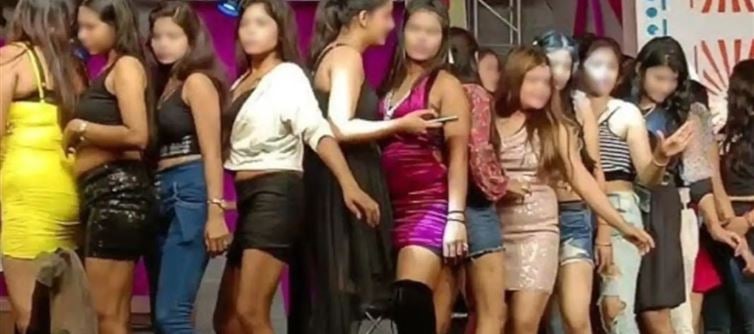
🔥WHEN A mela OF tradition HIDES A MARKET OF EXPLOITATION
Sonepur mela is celebrated as Asia’s largest traditional fair — a symbol of culture, heritage, cattle trading, and rural pride.
But behind the bright lights, crowds, and festive noise, investigators have now uncovered a deeply alarming parallel reality.
Around 1000 girls were being used in illegal shows, recruited, controlled, and exploited in secret theatre setups operating inside the fairgrounds.
Not hidden in the outskirts.
Not outside the gates.
Inside the mela — under the very noses of administrators, police teams, and district authorities.
What was marketed as a family event has now been exposed as a well-oiled trafficking ecosystem, protected by silence, negligence, and sheer administrative failure.
Let’s break down the shocking truths the nation must confront.
🔥WHAT THE SONEPUR mela SCANDAL EXPOSES
1. A Fair of “Tradition” Was Running a Parallel industry of Exploitation
On the surface:
cattle trade
folk shows
rural marketplace
cultural festivities
Behind the scenes:
illegal theatre setups
hidden rooms and cottages
agents directing customers
Young girls forced into performances
A mela meant to showcase heritage became a stage for organised abuse.
2. 1000 Girls Identified — But the Network Is Clearly Much Larger
The number reported — 1000 girls used in illegal shows — is only what initial checks uncovered.
If this is what inspectors found in limited raids, the real scale is likely far more alarming.
This didn’t happen for a week.
This wasn’t a sudden breakout.
This was systematic, long-running, and coordinated.
3. Agents Operated Openly — No Fear, No Concealment
One of the most shocking parts of the investigation was how blatantly agents operated.
One agent was caught on camera casually telling visitors:
“Drink outside, then meet the girl inside.”
When illegal operations become bold enough to advertise themselves, it means only one thing: they feel protected.
4. Minors Were Rescued — Proof That Traffickers Are Targeting Vulnerable Regions
In a rescue operation, five minor girls were found.
They came from:
Uttar Pradesh
Madhya Pradesh
Chhattisgarh
Nepal
Every region listed is a known hotspot for:
migration
poverty
trafficking vulnerability
These girls were reportedly:
forced to dance
prevented from leaving
monitored constantly
This is trafficking, not entertainment.
5. Nighttime “Entertainment Zones” Turned Into Trafficking Hubs
Daytime:
Families, buyers, traders, tourists.
Nighttime:
Illegal theatres, hidden cabins, agents, controlled entry points.
This is not improvisation.
This is organised exploitation operating in shifts.
6. Authorities Failed at Every Possible Level
Questions that UP must answer immediately:
Who approved fake participation numbers?
Who looked away while illegal shows multiplied?
Why were unregistered venues functioning openly?
Why were minors not flagged or protected sooner?
Why were ghost institutions receiving funds?
Why did no senior official face action?
The shock isn’t the crime.
The shock is how easy it was to commit.
7. The Mela’s Image Is Destroyed Unless Accountability Is Immediate
Sonepur mela was once a symbol of:
rural pride
cultural tourism
traditional trading
Now the world sees headlines linking it to:
trafficking
illegal shows
minors being exploited
total failure of oversight
If strong action is not taken NOW, the mela’s legacy will be permanently stained.
8. india Needs More Than Raids — It Needs Systemic Protection
If authorities are serious, they must:
conduct independent investigations
track trafficking networks across states
penalise organisers and protectors, not just agents
enforce strict surveillance in all large public gatherings
ensure safe repatriation and rehabilitation for rescued girls
Make mela permissions contingent on zero-tolerance protocols
Any less is cosmetic cleanup.
🔥 FINAL VERDICT: THIS IS NOT A FAIR GONE WRONG — THIS IS A FAILURE OF THE SYSTEM
When:
minors are exploited,
agents roam freely,
Illegal theatres run openly,
1000 girls are trapped,
authorities “discover” it only when cameras arrive…
…it becomes clear that this isn’t an accident.
It’s a symptom of institutional blindness.
The Sonepur mela isn’t the problem.
The problem is the system that allowed this criminal ecosystem to grow inside it without fear.
If the government doesn’t respond with serious, accountable action, india will have to ask a heartbreaking question:
Are our cultural events truly safe — or are they becoming marketplaces for exploitation?




 click and follow Indiaherald WhatsApp channel
click and follow Indiaherald WhatsApp channel